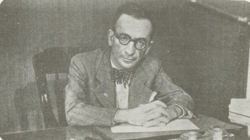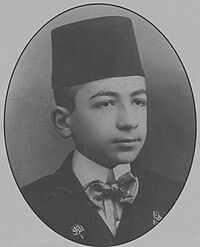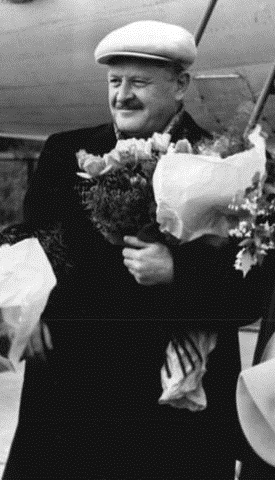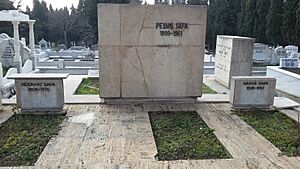Peyami Safa facts for kids
Quick facts for kids
Peyami Safa
|
|
|---|---|

Peyami Safa
|
|
| Born | April 2, 1899 Fatih, Istanbul, Ottoman Empire |
| Died | June 15, 1961 (aged 62) Kadıköy, Istanbul, Turkey |
| Pen name | Server Bedi · Çömez · Serâzâd · Safiye Peyman · Bedia Servet |
| Occupation | Writer · journalist |
| Nationality | Turkish |
| Period | 1910–1961 |
| Notable works | Cingöz Recai |
| Spouse |
Nebahat Erinç
(m. 1938) |
| Children | Merve Safa |
Peyami Safa (born April 2, 1899 – died June 15, 1961) was a famous Turkish writer, journalist, and newspaper columnist. He became well-known during the early years of the Turkish Republic. His psychological novels, like Dokuzuncu Hariciye Koğuşu (Ninth External Ward), were very popular. He often wrote about his own life experiences in his books.
Peyami Safa used many different pen names, with Server Bedi being the most famous. Under this name, he created the detective character Cingöz Recai. This character was inspired by Arsène Lupin, a famous French detective. Safa also worked for many newspapers and even started his own magazines, like Kültür Haftası, with his brother İlhami Safa.
The famous poet Tevfik Fikret gave him his name when he was born. Peyami Safa faced tough times growing up. He lost his father when he was very young. He also suffered from a bone illness in his right arm. He wrote about his experiences with this illness in his novel, Ninth External Ward. He started writing stories and novels while still in high school. His early stories, called Stories of the Century, were very popular. He also had many debates with other writers of his time.
Peyami Safa was very good at French. This helped him learn about Western culture and new ideas. He translated works by famous writers like Maupassant and Rousseau. In his later works, he always chose Istanbul as the setting. He explored the mix of Eastern and Western ideas in his stories. He wrote strong opinion pieces for newspapers like Milliyet. His friendships with writers like Nâzım Hikmet and Necip Fazıl Kısakürek later turned into disagreements. He supported different political parties over time, first the Republican People's Party and then the Democrat Party.
Peyami Safa wrote throughout his life, starting from a young age. He was mostly a nationalist and conservative writer. The Ministry of National Education even suggested two of his books for high school students. His works were also made into movies and TV shows.
Contents
His Life Story
Early Years
Peyami Safa was born on April 2, 1899, in Gedikpaşa, a neighborhood in Istanbul. His father, İsmail Safa, was a poet from Trabzon. His mother was Server Bedia Hanım. Peyami's father was against the ruler Abdülhamid II. He died in exile in Sivas when Peyami was only one and a half years old. This left his family with no money. Peyami and his brother İlhami Safa were raised by their mother in difficult conditions.
During his early school years, Peyami developed a bone illness in his right arm. Because of this, he couldn't go to school much. He spent a lot of time with doctors and other patients. This experience deeply affected him. He later wrote about it in his famous novel, Dokuzuncu Hariciye Koğuşu.
He started high school at Vefa High School in Fatih in 1910. Here, he met future famous writers and friends. He began writing his first stories and novels during these years. His first storybook, Don't Take This Book, was very popular. He couldn't finish high school because of his illness and his family's money problems. He taught himself French by reading a dictionary. He also became interested in medicine, psychology, and philosophy. He even tried to join a theater school but couldn't continue.
During the First World War, he started working at the Post Office to help his mother. Later, he worked as a teacher for a short time in 1917. He also worked for a government office in 1918.
After the War
These stories became very popular with people, which still surprises me. Young writers at that time really encouraged me. They asked me to sign my stories. Yakup Kadri said, "You brought us a new way of writing." Yahya Kemal said, "Peyami is the most beautiful work of Ismail Safa."
In 1918, Peyami Safa left his teaching job. He started a newspaper called Twentieth Century (Yirminci Yüzyıl) with his brother. His stories, published as "Stories of the Century" in this newspaper, became very popular. He also had his first public debate with another writer in 1919. He won a story contest, which encouraged him to write more.
After his newspaper closed, he worked for other newspapers like Tercüman-ı Hakikat and Tasvîr-i Efkâr. He also wrote for a women's magazine called Süs from 1923 to 1924. To earn money, he published his first novel, Sözde Kızlar (So-called Girls). By 1924, he had published several other works. In 1925, he started another short-lived newspaper. He also wrote for the Cumhuriyet newspaper using his real name and his pen name "Server Bedi". He worked there as a columnist and literary editor from 1928 to 1940.
In 1933, he wrote a special article about an event in Razgrad. In his early years, he wrote articles with modern and scientific ideas. He was interested in both Western and Turkish ideas. He was worried about the Turkish Letter Revolution, which changed the alphabet. He thought it might disconnect generations. However, he later supported it and joined language meetings.
His Relationship with Nâzım Hikmet
When Nâzım Hikmet, a famous poet, returned to Turkey, Peyami Safa published one of Nâzım's poems in Cumhuriyet. The newspaper then said the poem didn't reflect their views. After this, Safa left Cumhuriyet. He started writing for Resimli Ay magazine, which was known for its left-wing writers. Nâzım Hikmet and other famous writers also wrote for this magazine.
Peyami Safa and Nâzım Hikmet were friends for a while. Peyami Safa even dedicated his novel Dokuzuncu Hariciye Koğuşu to Nâzım Hikmet. Nâzım Hikmet praised this novel highly. He said it was much deeper than other popular books of the time.
Peyami Safa wrote an article called Varız Diyen Nesil (The Generation who says We Exist). This article was about young writers. It led to a big debate with another writer, Yakup Kadri Karaosmanoğlu. Safa was accused of supporting certain political ideas because he wrote for Tan newspaper. But he always said these claims were false.
Their friendship continued for some time. But Nâzım Hikmet wanted Peyami Safa to join his political views. Peyami Safa tried to change Nâzım Hikmet's mind. This led to a big disagreement between them. Nâzım Hikmet criticized Peyami Safa in an article. Peyami Safa replied in a magazine he published with his brother. From then on, Peyami Safa strongly opposed certain political ideas until the end of his life. Their disagreements also involved Peyami Safa's popular Cingöz Recai stories.
His Passing
Peyami Safa passed away on June 15, 1961, in Istanbul. He was 62 years old. This happened a few months after his son, Merve, died while serving in the military. Peyami Safa was buried in the Edirnekapı Martyr's Cemetery. At the time of his death, he was the chief editor of the Son Havadis newspaper.
His Writing Career
Most of Peyami Safa's novels were written before 1940. In these books, he often explored the differences between Western and Eastern cultures in Turkey. His novel Dokuzuncu Hariciye Koğuşu became very popular. In 1931, he wrote his only historical novel, which was about Attila the Hun.
Besides his novels, he wrote many stories that appeared in newspapers. He wrote for Cumhuriyet and Milliyet newspapers under his pen name "Server Bedii". Some of these stories were about a clever thief named Cingöz Recai. Safa also wrote for magazines like Yedigün and Serdengeçti.
Images for kids
 | Isaac Myers |
 | D. Hamilton Jackson |
 | A. Philip Randolph |





